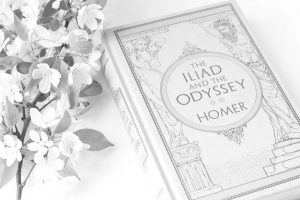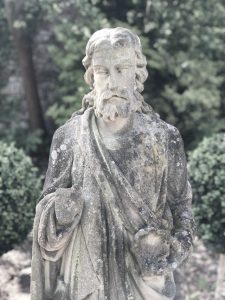Thinking has been discarded for routine, and the romanticism of trees growing from the mind have been chopped down as fuel. Even language has become idle – by sitting the circus examinations, that treasured spectacle of the hoop jumping extravaganza, we are sat in submission. Nearby, clocks drum with the batons of a relay that started at three. We have been passing around this idol of education to other people, holding it in our hands, but we never get to look, or to touch longer than the time it takes for our feet to smack out on a track from one to nine, A to F. When we stay at home, put thermometers in the kettle, or fake a stomach ache using the sounds of cereal cascading into the toilet, it is always the threat of police intervention given to us. My parents never told me that I was missing out on key development. And if you listen close enough, you can hear the government entering stage right, holding up my skull – alas, poor Abbi, ‘twas not your fault but society. I ask what kind of person society is, and there is a peculiar strain of anxiety in the quivers of their puppet strings. The blustering and the spit – ahem, is this rhetorical, a mere metaphor – convinces me that the government does not know about Grice’s Maxims, and if this was an essay, on language acquisition in children, I would pull up national exams and memory tests as evidence of error. Someone, or a ghost, once argued that we are nothing more than tissues of textuality. If the education system was a book, it would be sold only on Amazon.
Sometimes we need to indulge ourselves in metaphors and gothic melodrama, stretching them out big enough on a paper so that it becomes a leftist pop-up book, on important matters such as these. Education, somehow, somewhere, crouched down, little Rafe with a Faustian book, with our worst lexical combinations and contexts and produced a dangerous satire on the culture of learning and academia; stereotypes, from bookworm to teacher’s pet, so that the promethean fire kindling in a child becomes transmuted into a cruel reflection of society’s worst insecurities. It is a thorn that stabs without roses, the nettle sting without the adventurous consent of a curious touch, and the guilt and dreaded title of lower-class human being that articulates itself inside the mind of a child that just wants to know about a black hole. If we dare to progress in such environments, we are milky familiars to radical witchcraft when we aim for A, question the validity of A, dress up A, that wonderful letter rich in clean notebook and pink highlighter imagery, undress A, put A under the knife, bring this A back to life. Even as I type this, the bleak architecture of pejorative symbolism rises with a groan and pierces my fingertips. The ladders of success are laced in snakes, but instead of an apple that they offer, it is the crunched bite of the floor – to fall, to accept second status, after all (they hiss), is kinder than the perpetual elevation of ridicule. The word ambition is sore on the tongue.
I am terrible at cooking – the ‘sat in a catered university hall because I cannot fry an egg’ sort of masochism to my bank account. Even so, the sludge and flour of the weighing scales they judge us by sticks to me all the same. Scrubbing it off, why am I Lady Macbeth? The blood simply sticks. At night, I chain myself to the bed because I am afraid of what I may say. It might just slip out of my subconscious, that I am poor and that I should not do a humanities degree. The horses went mad on the day he committed a sin, in the play, the play about the king. When I look at the animals dragging us to our apocalypse – the culture of learning, corporations, late capitalism, consumer culture – I wonder if they were just always mad.
Moving away from Shakespearean allusions, let us consider another perspective. Examinations and the current A Level specification are dreadfully mathematical. Grades are the Bitcoin currency for our generation, barely understood and somewhat intimidating to gather. They feel second best, worthy of a Facebook post and a night out in a good dress. We flaunt them to our friends, and we convert them into the currency for our futures. As I consider this, who taught us to barter for our lives? The illusive second person, you, vous, tous (never), where are you hiding? I can’t keep throwing darts at Michael Gove, my door is almost done being collateral damage at my revenge for the biggest Trojan Horse scandal of our time in education. When they roll in with the new grading system like gift to our generation, perhaps there isn’t anyone waiting inside. Perhaps they expect us to climb inside, an assisted kidnapping, no invasion. In fact, we were apologetically shoved and stuffed inside – the sorry, sorry, from our teachers, it’s a big change but Troy has fallen. We are sucked into a system that gives us a number, a letter, and expects us to cherish them like a nickname given to you from a respected older student. One day, I think the system owes the alphabet an apology. I would say we need one too, but what we need is an imperative. And also, with the oratory power of one esteemed Mr. Boris Johnson, I do not think he could bluster through a ‘too bad’ before his hidden Machiavellis roll out a new specification. Trojan horse or not, their oratory power to inspire a generation falls short of Odysseus.

However, we must never ignore that education, aside from its systematic faults, is an epic to challenge even the inspiring words of Homer and Virgil; it is a thrill ride through history, different customs, different feelings, and in every text I read, there is that familiar drum that plays for no swords or famished bones. Education is one of the only humane conquests, and I want it to have one vital policy – no more sacrifices. Let us be safe and kind before we are noble and red, for there is a particular beauty around the culture of sacrifice. If we are to make a sacrifice today, let it be the colossal wreck in the sand. We must walk away from tradition and examination that oppresses inspiration. We have given it enough love, and yet, the breath that touches us from the stone of its lips is still cold. Even colder are our boots in the mud – turn around, bold 600. We should have no Lord Raglan, no Lucan, not even the profound sense of Wellington in our seating plans mashed into trenches. Sometimes when we are alone and when our conversations on change hit the white walls to nothing, I call out to the Tennyson of year 11, year 12, year 13, but he has nothing to say to me anymore.
Aside from what grades I will get for exams I will never sit, my experience over the past seven years in the education system has been completely worth it. I may be short, but even thought I am a little taller than my previous head teacher, it took her hands as well as mine to pull down the dusty hoops that I hit my head on when I want to talk Kristeva as well as Crystal, Jacques Lacan as well as Jespersen. Hand in hand, we transmuted the old rocks of a specification into the golden store of knowledge I have on Angela Carter, the reason why I look at King Lear and Larkin and smile. My grandmother worked with bears before she fled from Germany after the war. She was a teacher, too, but she worked first in Britain in a crisp factory. Somebody died, she said, as they sank into a large vat of frying oil. It was hard to notice the circus past in the lines of her face, but she could see it in me when she helped me with my homework for a while. When she held the papers out in front of her, a dazed look lost in a council house living room, I wondered what oil stuck to my math sheets, my French homework, the geography study linked to snails.
When I was four, and my older sister five, we used to play the silent game and skip past toys in complete silence. The loser would be the one to make a noise. Unfortunately for me, my mother had dressed me in a loud pair of trousers, so with each step, over the tissues, over Bob (Bob the Builder to those less acquainted), I gave myself away. Despite the victory calls of my older sister, my grandmother gave me a wink of rogue wisdom, knelt down next to me and said, ‘don’t you worry – what is out of your control should not be used against you’, and when I was sick during my GCSE mathematics exams, I was told to apply for special consideration. The fear of knowing that the fatigue of my own immune system could potentially jeopardize one of the most important papers of my life was terrifying. The pragmatists and household income groups above 25,000 will swish their cups and provide a tight ‘don’t worry, it doesn’t matter anyway’, but the symptoms I suffered two years ago is not the sickness that we should be diagnosing today.
We have been through a lot, together, you and me, my audience from another place, but I am determined to make the coin you paid for this kaleidoscope worth it, so take my hand for a little while longer and let us look at showers. I do so love indulging in a post-production argument in the shower, conjuring up my best rebuttals and cutting remarks to a person who probably only received a blunt response from me earlier. The drama of it all, the water falling to the floor, shampoo bottles punched or used as microphones, and mothers, fathers, parents, siblings, even pets, lifting their heads up in wonder from living room chairs as they hear upstairs the all-time noun of hate ‘sweetie’, and second in line, ‘darling’. Fear a student that ends their sentences in sweetheart. Fear those who do not need to swear.
So, if our best arguments are done when we are in a comfortable environment and given enough time, then why should we be expected to produce our greatest essay answers on a cheap desk and chair ensemble with time enough to fit only two episodes of The Office? Essay answers that determine our future should not be done in a hall, not a shower (although, I have sat in a bath tub and cried for inspiration during my art coursework), but in a place comfortable enough for us to be proud of what we create. We have too many Victor Frankenstein’s that spend months running away from their answers, too afraid to take responsibility for a mistake done in thirty minutes per question.
It is about time that we execute the hoops and dismantle the labyrinths that fail a generation, and it is about time that our architects and our builders for the next system are not those too comfortable now with apathy. For too long have students been forced to pull up your fingertips, you, the illusive second person, tous, my enemy, with expect forensic art and wear them on our hands when we write our own name and that same date on that same paper. Education, the current noun, not the verb we love, you locked us in a closet and now we are coming out.
When I, poetic like this, felt the words rising on the surface of my arms like a hot braille I can’t keep down. The same teacher that taught me how to write also taught me how to tell it straight. If she is reading this now, I ask forgiveness for my tangents, but not for my purpose.
Teachers are the last line of defence for children that have been failed before. If this were a poem, I would have no caesuras because this mantra has been playing from the beginning. Illusive you, vous, do not make the hoops gallows for children. Let us hang our achievements, not our dead-body futures, dreams, drained of stardust and stuffed with stage dust.
 If education is going to take us out of 2020, it has to start accommodating everyone, and not just on a zoom screen. It has to lose the scales, the Florence Nightingale over Mary Seacole, STEM over humanities, economy over aspirations, the Winston Churchill in all of us. Didn’t you know? We have statues too.
If education is going to take us out of 2020, it has to start accommodating everyone, and not just on a zoom screen. It has to lose the scales, the Florence Nightingale over Mary Seacole, STEM over humanities, economy over aspirations, the Winston Churchill in all of us. Didn’t you know? We have statues too.

Abbi Craggs
Abbi is studying English Literature at Durham University, her interests include: literary criticism, specifically the work of Kristeva and Lacan, as well as magic realism and linguistic theory.
She is studying at St Chad's College, Durham, and was awarded the Dr Joe Cassidy Memorial Bursary. An aspiring writer, winning the Lancaster University Writing Award, Abbi hopes to pursue writing further during her time at university.




